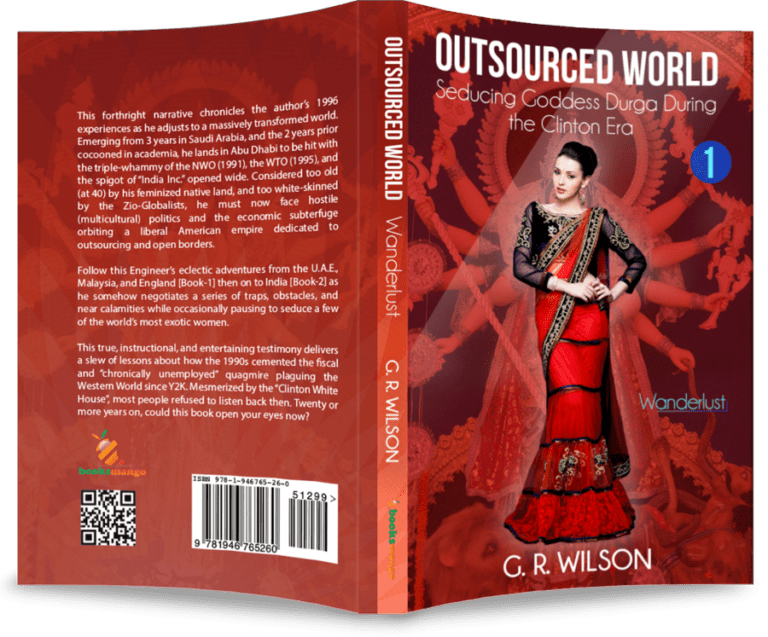What exactly was the '90s? This is an important question that GR Wilson answers on many levels in “Outsourced World,” the first volume of his adventure novel.
The subtitle of this first volume is WanderlustIt eloquently portrays the depression Wilson felt during that decade as an engineer entering middle age, exiled from an ossified Britain.
Wilson entered the 1990s as an optimistic man who had every reason to expect that he would be held in the same high regard as generations of treasured British expatriates before him, and he left it as a wiser man, heartbroken but with seeds of analysis sown.
These come to fruition in the present (2017) as he pieces together a grander scheme behind his own frustrating personal experiences of searching for suitable work in the United Arab Emirates and Malaysia in 1996. Both these countries are former leading members of the former British Empire and this commentator interacted with the sons of privileged families from both countries at a boarding school that very year and overheard chatter that their countries were undergoing rapid economic change agreed upon at certain levels of the establishment.
The autobiography that forms the backbone of this book is a gripping personal adventure told by a true storyteller. It soon becomes clear to the reader that he may be a member of a vanishing species in the West: a passionate yet moral and humble character, combining the qualities of both a “man's man” and a “ladies' man.”
The story is casually interwoven with Wilson's hard-earned, years-honed research into the financial conspiracies and mind-control plots that now grip the world, and which he sees as plots to suck the life out of our economy and culture. Throughout its nearly 200 pages (supplemented by addendums), the book is liberally peppered with references to the best available sources on said plots, all tried and trusted, most of which were written by determined researchers and published in mid-20th century America.
The most detailed of Wilson's hypotheses (all of which are highly plausible and seriously worked out) concerns the BBC and CNN-induced blind panic (“run at the slightest sign of threat”) that occurred among Westerners in the southern Arabian Gulf (the non-threat area) in the months leading up to the 1991 Gulf War. The panic was so severe that many Westerners willingly left their valuables behind (never to be returned). He argues that this embarrassing episode led Gulf Arabs to correctly infer that these mind-controlled residents were not like their fathers and should no longer be trusted with the development of the region.
The Arab states of the Persian Gulf then, with the UAE capital Abu Dhabi at the forefront, quickly signed large-scale, largely secretive contracts to replace their existing foreign labour classes with much cheaper, more docile but less qualified Indians, while in petrodollar-dominated Saudi Arabia this concerted replacement project was carried out by Egyptian and Filipino labour.Thus the stage for much of the 2010s West-to-East global digital identity (essentially microchipped stooges) featured in the UK columns. One World Governance Article series.
Everything Wilson traces in this book is just one element of the (still Western-led) “New World Order” that, as various models show, was formally announced in 1991 and gained momentum throughout the 1990s, a decade marked by the scandal-ridden Clinton administration. (Events in the former Yugoslavia during that decade, which Wilson does not cover, should be evaluated in this geopolitical light.)
Clearly a British patriot of the old school, Wilson spends several chapters quietly despairing at the distortion of our national character. He regularly testifies to the contrasting civility and humanity of the Muslims and Asians he encounters in the United Arab Emirates and Malaysia, and never begrudges their growing prosperity at the expense of the West.
This book is a treasure trove of signposts and observations that any reader of the British column will appreciate for its honesty, consistency and style. If so, Volume 2, which will describe his varied experiences in India, will be equally instructive. Wilson has announced that Volume 2 will also complete his explanation of what he means by “India.” Durga It's in the series subtitle.
So what was the '90s all about? Wilson's short answer is that it was a decade dominated by the madness and megalomania of a conspiring, largely transatlantic elite. There just wasn't enough time to undo their deeds.
If that piques your interest, the author maintains a dedicated website (and blog). here.


